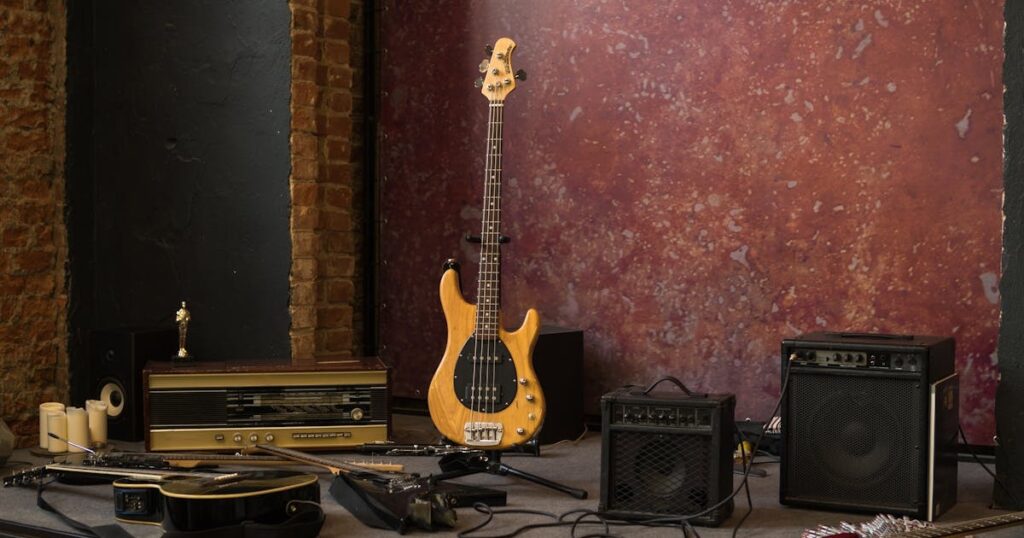Key takeaway: The best electric guitar for blues combines classic design with versatile sound. When selecting, consider factors like tonewoods, pickups, and playability. The right guitar can enhance your blues playing, making for an enriching musical experience.
When it comes to playing blues music, the guitar is an essential instrument that sets the mood and creates soulful melodies. As a cultural phenomenon, blues music has been around for centuries and continues to be a source of inspiration for many musicians.

Whether you’re a seasoned blues player or just starting out, choosing the right electric guitar can make all the difference in achieving that signature sound. In this guide, we’ll delve into what makes a great blues guitar and provide you with our top recommendations.
What Is A Blues Guitar?
A blues guitar is any type of guitar used to play blues music. While there is no specific design or brand that defines a blues guitar, there are some characteristics that make it stand out from other types of guitars.
For one, the sound of a blues guitar is often described as warm, rich, and soulful. This is achieved through using specific pickups and tonewoods that contribute to its unique tone. Blues guitars also tend to have a shorter scale length compared to other electric guitars, making them more comfortable and easier to play for extended periods.
Additionally, the design of a blues guitar is often simpler and more traditional than other electric guitars. It may have a single-cutaway body shape or feature classic finishes like sunburst or natural wood.
What Should I Look For In A Blues Guitar?
When shopping for a blues guitar, there are a few factors to consider to ensure you end up with the best one for your needs.
Tone
As mentioned earlier, the tone of a blues guitar is crucial. Look for guitars with single-coil pickups, as they tend to have a warmer and more vintage sound compared to humbuckers. Additionally, consider the tonewood used in the body and neck of the guitar.
Mahogany, alder, and ash are popular choices for blues guitars due to their warm and resonant qualities.
Playability
The playability of a guitar refers to how comfortable it feels in your hands while playing. The scale length, neck shape, and fretboard radius all contribute to the playability of a guitar.
For blues music, a shorter scale length (around 24.75 inches) is generally preferred as it allows for easier string bending and fretting. A slim neck profile and a flatter fretboard radius are also ideal for playing quick blues licks.
Style
While style may not be the most critical factor when choosing a blues guitar, it’s still worth considering. Blues music has deep roots in tradition and nostalgia, so opting for a classic design can add to the overall vibe and aesthetic of your performance.
The Top 5 Blues Guitars
Now that we’ve covered what makes a great blues guitar, let’s dive into our top recommendations for the market.
Fender Stratocaster
The Fender Stratocaster is a timeless classic that has been used by some of the greatest blues guitarists, including Eric Clapton and Stevie Ray Vaughan. Its single-coil pickups provide a distinct and warm tone that is perfect for blues music.
The slim C-shaped neck and 9.5-inch fretboard radius make it incredibly comfortable to play, allowing for quick movements along the fretboard.
Gibson Les Paul
The Gibson Les Paul is another iconic choice among blues musicians. Known for its fat and punchy tone, this guitar features humbucking pickups that deliver a rich sound with plenty of sustain.
The shorter 24.75-inch scale length also makes it easy to bend strings and achieve that trademark blues sound.
Gretsch G5420T Electromatic
For those looking for a more affordable option, the Gretsch G5420T Electromatic is an excellent choice.
This guitar has a semi-hollow body design, giving it a unique tone that falls between an acoustic and an electric guitar. Its Filter’Tron humbucking pickups provide a clear and warm sound with plenty of character, perfect for blues music.
Epiphone Casino
The Epiphone Casino is another budget-friendly option that delivers impressive quality. With its hollow body construction and P-90 pickups, this guitar produces a bright and lively tone that is perfect for blues. It also has a slim taper neck and a 12-inch fretboard radius, making it comfortable and easy to play.
PRS SE Custom 24
The PRS SE Custom 24 may not be the first guitar that comes to mind when thinking about blues music, but its versatility makes it a worthy contender.

With its dual humbuckers and coil-splitting capabilities, this guitar can produce both warm and twangy tones, making it suitable for various styles of blues.
FAQs
Can I use an electric guitar to play the blues?
While any electric guitar can technically be used to play blues music, certain designs and features are better suited for achieving the desired tone and playability.
Do I need a specific type of amp to play blues?
While some amps may be better suited for certain genres, any good-quality amp can work well for playing blues music. Experiment with different settings to find the sound that best suits your style.
Are there any specific techniques or skills needed to play blues on an electric guitar?
Blues music often involves bending strings, vibrato, and using slides. Practicing these techniques is essential for mastering the blues guitar style.
Conclusion
Choosing the best electric guitar for blues can be a daunting task, but understanding what makes a great blues guitar and considering factors like tone, playability, and style can help narrow down your options.
Whether you go with a classic Fender Stratocaster or opt for something more unconventional like the PRS SE Custom 24, the most important thing is to find a guitar that feels comfortable and allows you to express yourself through music. Keep practicing and experimenting to develop your own signature sound on the blues guitar.
